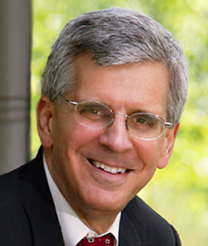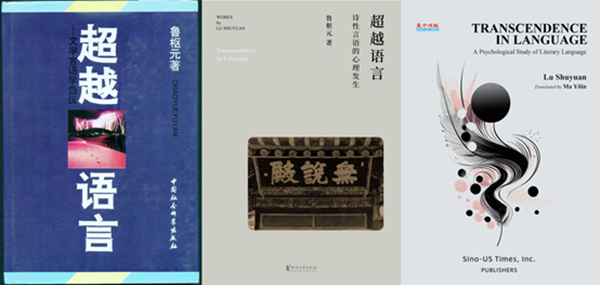美东时间2025年3月29日晚8时,美西时间3月29日下午5时,北京时间3月30日上午9时,来自美国和中国十几所知名高校的专家学者在线上齐聚一堂,共同参加由美国中美后现代发展研究院主办的过程哲学视域下的语言学研究暨鲁枢元教授语言学思想国际研讨会。美国过程研究中心主席杰伊·麦克丹尼尔在发言中说,正如地球上各种生物各有其形态,语言也因环境和情感而各异。虽然语言孕育了一种独特的人类沟通方式,但它的能量却能影响万物。对鲁教授和怀特海来说,诗性语言尤其重要。

以下是杰伊·麦克丹尼尔主席发言全文,马伊林、杨婧妮译
语言与生生不息的地球
——怀特海视角下的探索
杰伊·麦克丹尼尔
引言
首先,我要感谢鲁枢元教授在《超越语言》中对语言的深刻探索。我非常钦佩他对“居于语言之中的心理体验”这一过程的剖析。书的开篇,他坦言在西方语言哲学家中,他更认同柏格森而非索绪尔,因为他关注的是语言中蕴含的生命体验,而非仅仅探讨语言可能呈现出的形式结构。
怀特海、柏格森与生成过程
在本文中,我借鉴另一位常与柏格森相提并论的体验哲学家——阿尔弗雷德·诺斯·怀特海的思想。正如柏格森把生命看作永恒的生成,怀特海也认为生命是一个不断生成的过程,其核心在于真实的体验。对他来说,这种生成既是体验性的又是相关联的,每一刻的体验都在与其他有情存在建立联系——这些存在既包括人类,也包括非人类。它们共同构成了生生不息的地球,而地球又是生生不息的宇宙的一部分。怀特海认为,整个宇宙——天地万物——都在不断孕育着创造力。本文正是以此为出发点,探讨语言与生生不息地球之间的关系,与鲁教授的著作遥相呼应。正如鲁教授所言,语言本身即是这种创造力的丰富表达。
生生不息的地球与超越文字的交流
在怀特海看来,语言诞生于文字之外的广阔天地——这个天地就是生生不息的地球。地球绝非死寂之物,而是充盈着情感与能量;更非沉默无声,万物始终在彼此对话。生命体,像动物、植物、山川、河流,都在通过能量与情感持续交流。作为地球生命共同体的一员,人类同样进行着超越文字的沟通:婴儿在掌握语言前,便通过触摸、目光、动作和声音表达情感。文字只是一种特殊的沟通方式,它们总是在前语言的互动中孕育而出。即使当我们用语言交流时,也能感受到彼此那种不言而喻的存在。在语句形成之前,在最早发声之前,早已存在着原始而直接的关联体验。
无论是书面、口语、歌唱还是手语,语言始终根植于丰富的生活体验中,用怀特海的话说,即“合生”过程。它并非一套脱离生活的符号系统,而是从真实体验及其前语言层面中生发出来的意义创造。正如地球上各种生物各有其形态,语言也因环境和情感而各异。虽然语言孕育了一种独特的人类沟通方式,但它的能量却能影响万物。对鲁教授和怀特海来说,诗性语言尤其重要。诗歌让语言拓宽了表达的边界,把一些平常话语难以传达的生命感受与地球的神秘融入其中。诗中,我们能听见那在说明书中消逝的声音,感受到在工作指令里难觅的温度。
至少怀特海是这样认为的。他特别推崇像华兹华斯(1770–1850)和雪莱(1792–1822)这样的浪漫诗人,他们通过诗性语言传达地球的灵性,超越了科学家那种务实的描述。怀特海的《科学与现代世界》便是在探索科学与诗歌如何共同彰显生生不息的地球所蕴含的活力与美丽。
河畔诗人:体验中涌现的语言
试想一位诗人坐在河边,正在构思一首关于“临水而坐”的诗篇。在提笔之前,他直接感受着河流的气息:水流的韵律、树叶的私语、水面上斑驳的光影。这一刻并非孤立的体验,而是交织着往昔临河的记忆、曾读过的诗句以及诗人自身对语言的独特感悟。随即,在语言创作的瞬间,诗人选取词句将这种体验凝练成新的诗篇。这些词语并非对外界简单的标记,而是从他那“合生”过程中自然涌现的,饱含着记忆、情感与期待。
主观形式与语言的情感基调
但诗意不止于此:诗人的词句始终蕴含着怀特海所说的“主观形式”,即为体验增添温度的情感色彩。语言绝非中立信息的载体——它永远浸润着感受。即便在最抽象的表述,如数学公式或科学描述中,也潜藏着微妙的情感张力,塑造着意义的感知与传递。
地球:生生不息的表达
诗人的体验从未脱离地球这条生命长河。河流有着自己的历史:它跨越岁月,塑造山谷,滋养生态,把雨滴、岩石和生命的印记汇入水流。风中低语的树叶应和着无形的气流,而气流又受全球热力运动的影响。水面的粼粼波光见证了地球与太阳的永恒对话——这种宇宙韵律主宰着季节轮回与生命循环。
诗人并非世界的旁观者,而是与这不断生成的生命共舞。
如同诗人用词语将体验凝成诗篇,地球也在自我表达:河水流淌,风穿林梢,鸟鸣婉转,晨光中花朵悄然绽放。世界充满符号、姿态与韵律——这是无需人类文字的生命语言。若诗人用心倾听,其词句便不是强加于河流之上的意义,而是应和着河流自身的故事,编织进联结万物的交流之网。因此,语言不仅再现世界,更诞生于感受、可能与选择的动态交织。
怀特海的命题:感受的召唤
那么,语言的单位是什么?
我们通常认为是音素、词素、单词、句子与习语。虽然这些常规语言单位助力意义的构建与传递,使我们得以解析语言的运作机制,但它们的价值远超于此——它们塑造了我们体验与表达世界的方式。
正因如此,怀特海提出了“命题”这一概念。他认为,不同于语法句子,命题并非仅仅是对现实的陈述,而是一种感受的召唤,一扇邀请我们以特定方式体验世界的窗口。它不仅仅承担着真理主张的功能,更开启了通往全新感知和反应方式的可能性。
语言与生命的呼应
在怀特海看来,命题不只存在于人类话语,它们渗透在万物之间——每个当下都蕴藏着多种生成的可能。正如诗人回应那捕捉本质的词句,河流回应着重力的牵引,树木回应着阳光的邀约,飞鸟回应着风的呢喃。河水潺潺、微风低语,婴儿的啼哭与父母的回应,均构成了充满意义的瞬间。
结语:生机地球中的生机语言
早在语言结构成形之前,婴儿与看护者之间的呼应已经揭示了语言的本质——它不仅仅是传递信息的工具,更是与世界动态的情感交融。婴儿承袭着河流的脉络,在感受与回应的激流中前行;正如河流延续着婴儿的轨迹,在与周围世界的互动中塑就自身的流向。
在当下,我们需要那些充满诗意的探索者,他们敢于在语言的长河中畅游,发掘出新颖表达方式,使人类轻盈栖居地球,与万物和谐相处。生态文明既需要科学,也需要诗歌。鲁教授与怀特海提醒我们,既要扎根于这生生不息的地球,也要为之高歌。

鲁枢元著:《超越语言》(初版),中国社会科学出版社1990年版
鲁枢元著:《超越语言》(修订版),浙江文艺出版社2023年版
Lu Shuyuan: TRANSCENDENCE INLANGUAGE A Psychological Study of Literary Language
Sino-US Times, Inc.1924
杰伊·麦克丹尼尔博士:汉德里克斯学院世界宗教荣休教授,美国过程研究中心董事会主席,柯布研究院理事,美国中美后现代发展研究院理事,开放视野网站(www.openhorizons.org) 丰盛灵魂乐队/四J乐队吉他手与歌手。
Language and the Living Earth: A WhiteheadianExploration
JayMcDaniel
Chair,The Center for Process Studies
Editor,Open Horizons website
Introduction
First, Iwant to thank Professor Lu Shuyuan for his remarkable exploration of languagein Transcendence in Language: A Psychological Study of Literary Language.I deeply appreciate his examination of the psychological and experientialprocess of living in language. At the outset of his book, he acknowledges that,among Western philosophers of language, he aligns more closely with Bergsonthan Saussure. His focus is on the lived experience of language rather than ondiscerning formal structures that language may or may not exemplify.
Whitehead, Bergson, and the Process of Becoming
In thisessay, I draw upon the work of another philosopher of experience often alignedwith Bergson: Alfred North Whitehead. Just as Bergson saw life as a process ofbecoming, Whitehead saw life as a process of becoming, with lived experience atits core. For Whitehead, this process of becoming is both experiential andrelational: every moment of experience is an act of being in relation to othersentient beings—other beings with perspectives of their own, both human andnon-human. These beings are part of the living Earth, itself a part of theliving Universe. Whitehead sees the whole of the universe - the earth and theheavens - as alive with continuous creativity. This essay offers an explorationof language and the living Earth, complementing the spirit of Professor Lu’smarvelous book. As Professor Lu makes clear, language is, or can be, atremendously rich expression of that creativity.
The Living Earth and Communication Beyond Words
ForWhitehead, language begins in a world beyond words. This world beyond words isthe living Earth. The living Earth is not lifeless or inert; it is filled withfeeling and energy. And it is not beyond communication. Living beings—animals,plants, trees, hills, rivers—communicate with one another constantly throughexchanges of energy and feeling. As part of the living Earth, human beings alsocommunicate in wordless ways. Indeed, before infants acquire language, theycommunicate through touch, gaze, gesture, and sound. Words are a particularform of communication, but they emerge alongside and out of pre-verbalinterchange. Even as we communicate linguistically, we feel the presence ofothers pre-linguistically. Before there are sentences, before even the firstspoken sounds, there is relational experience—raw, immediate, and felt.
Language—whetherwritten, spoken, sung, or signed—always occurs within the larger context oflived experience, or, in Whitehead’s terms, concrescence. It is not a detachedsystem of symbols but an active process of meaning-making that unfolds withinand amidst lived experience and its preverbal dimensions. Language, then, is anearthy activity, as varies in its expressions as are the species of animals andplants and insects, the varieties of landscapes and waterways, that are part ofthe Earth's vitality. Language is part of the living Earth, albeit fostering aspecial kind of communication whose energies affect the whole of life, but themeanings of which are understood primarily by human beings. One kind oflanguage, important to Professor Lu and to those of us in the Whiteheadiantradition, is poetic language. Poetry opens language into domains of humanlife, and indeed domains of the Earth itself, that are not as readily communicatedin more prosaic forms of linguistic living. We can hear things in poeticlanguage that we cannot hear in instruction manuals; we can feel things inliterature that we cannot as readily know through marching orders.
At leastso Whitehead thought. Whitehead was especially appreciative of what Romanticpoets such as William Wordsworth (1770–1850) and Percy Bysshe Shelley (1792–1822)could communicate, in poetic language, about the spirituality of the Earth. Hesaw their language as transcending the valuable but more prosaic accounts ofthe scientist. They revealed what Whitehead believed was a more spiritual sideof life, indeed a spiritual side of nature. His Science and the Modern World wasitself an exploration of how both science and poetry illuminate thevitality and beauty of a living Earth in a living Universe.
The Poet by the River: Language Emerging from Experience
Considera poet sitting by a river, composing a poem about “sitting by the river.” Beforea single word is written, the poet experiences the river directly—the flow ofwater, the rustling of leaves, the shifting light on the surface. This momentis not isolated; it carries the echoes of past encounters with rivers, pastreadings of poetry, and a personal history of language itself. Then, in an actof linguistic creation, the poet selects words to capture this experience,shaping it into something new. These words are not mere labels affixed to anexternal world but emerge from the poet’s concrescence, infused with memory,emotion, and expectation.
Subjective Forms and the Emotional Tones of Language
Yet theycarry something more: the poet’s words are always clothed in subjective forms,Whitehead’s term for the emotional tones that qualify lived experience.Language is never merely a vehicle for neutral information—it is always imbuedwith feeling. Even in the most abstract expressions, such as mathematicalequations or scientific descriptions, there is an underlying emotional charge,however subtle, shaping how meaning is felt and conveyed.
The Earth as a Living Expression
The poet’sexperience is not separate from the larger life of the Earth. The river, too,has a history; it has flowed through landscapes for centuries, shaping valleys,nourishing ecosystems, and carrying the imprints of rain, rock, and life alongits course. The leaves that rustle in the wind respond to unseen atmosphericcurrents, themselves shaped by global patterns of heat and motion. The lightthat dances on the water is part of the Earth’s ongoing relationship with thesun, a cosmic rhythm that governs seasons and cycles of life.
In thisway, the poet is not merely observing the world but participating in itsongoing process of becoming.
Like thepoet selecting words to shape an experience into a poem, the Earth, too,expresses itself. Rivers move, the wind whispers through trees, birds sing, andflowers unfold silently in the morning light. The world is full of signs,gestures, and rhythms—a vast and living language that does not require humanwords to speak. If the poet listens deeply, their words do not impose meaningonto the river but emerge in response to the river’s own story, woven into thegreater web of communication that binds all living things. Language, then, doesnot merely represent the world; it emerges from a dynamic interplay of feeling,possibility, and selection.
Whitehead’s Propositions: The Lure of Feeling
What,then, are the units of language?
Weordinarily think of them as phonemes, morphemes, words, sentences, and idioms.These conventional units help structure and convey meaning, allowing us toanalyze how language functions. However, their significance extends beyondmechanics; they shape the way we express and experience the world.
Thisfoundation sets the stage for Whitehead's unique addition to our understandingof language: the proposition. Unlike a grammatical sentence, a proposition inWhitehead’s philosophy is not simply a statement about reality but a lure forfeeling, an invitation to experience the world in a particular way. It does notfunction merely as a truth claim but as a possibility, an opening toward newways of perceiving and responding to the world.
The Call and Response of Language and Life
Propositions,in this sense, are not confined to human discourse; they are present in thevery fabric of existence—offered to each moment as potential ways of becoming.Just as the poet responds to the lure of a phrase that captures somethingessential, so too does the river respond to the lure of gravity, the tree tothe lure of sunlight, and the bird to the lure of the wind. Just as the rivermurmurs and the wind whispers, the baby’s cry calls out, and the parentresponds, drawn into a shared moment of meaning.
Conclusion: A Living Language in a Living Earth
Longbefore structured words emerge, the call and response between baby andcaregiver reveal the deeper nature of language: not merely a tool fortransmitting information but a dynamic, felt engagement with the world. Thebaby is in the tradition of the river, carried by currents of feeling andresponse, just as the river is in the tradition of the baby, shaping its coursein relation to the world around it.
There isa need in our time for poetic explorers—people with the courage and creativityto swim in the currents of language, discovering new ways of speaking andwriting that open possibilities for dwelling lightly on the Earth and gentlywith one another. An Ecological Civilization needs poetry as much as science.Professor Lu and Whitehead remind us to take our place within the living Earth—andthen to sing.
Dr. Jay McDaniel
Professorof World Religions, Hendrix College, Emeritus
Centerfor Process Studies, Board chair
CobbInstitute: A Community for Process and Practice, Board member
Institutefor Postmodern Development of China, Board member
OpenHorizons (www.openhorizons.org)
Fat SoulBand/Four J's Band: guitarist, singer
相关链接:
鲁枢元语言学国际研讨会01:过程哲学视域下的语言学研究暨鲁枢元教授语言学思想国际研讨会成功举办
鲁枢元语言学国际研讨会02:让诗性语言照亮充满生机的地球
鲁枢元语言学国际研讨会03:一部极具现实意义的旧作
鲁枢元语言学国际研讨会04:全息的、生态的、宇宙论的语言学贡献
鲁枢元语言学国际研讨会05:语言与生生不息的地球
鲁枢元语言学国际研讨会06:《超越语言》富有十足的创新力和前瞻性
鲁枢元语言学国际研讨会07:AI生成語言視閾下回視魯樞元的《超越語言》
鲁枢元语言学国际研讨会08:语言的心理维度与生态维度
鲁枢元语言学国际研讨会09:从结构主义到生态主义
鲁枢元语言学国际研讨会10:运用语言最终是为了超越语言
鲁枢元语言学国际研讨会11:《超越语言》的学术贡献
鲁枢元语言学国际研讨会12:《超越语言》的学术贡献
鲁枢元语言学国际研讨会13:鲁枢元教授生态政治中的三元语言
鲁枢元语言学国际研讨会14:请给人性留下一点空间




